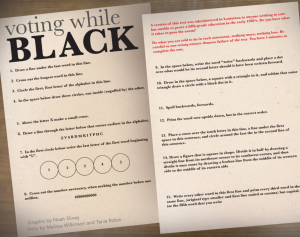A test of time: Black History Month at Meramec
BY : MELISSA WILKINSON
Editor-in-Chief
 The Louisiana Literacy Test, given to voters in the 1960’s, was marketed as a test to determine if takers were educated enough to vote. It was supposedly given to anyone who couldn’t prove education beyond a fifth-grade level, but according to news blog Slate.com, the test was given disproportionately to black voters. Many states had their own versions of the exam.
The Louisiana Literacy Test, given to voters in the 1960’s, was marketed as a test to determine if takers were educated enough to vote. It was supposedly given to anyone who couldn’t prove education beyond a fifth-grade level, but according to news blog Slate.com, the test was given disproportionately to black voters. Many states had their own versions of the exam.
According to Buzzfeed, the test, some questions from which are reproduced above, had no formal answer key. Whether the taker passed or failed was left to the discretion of the grader. Participants had 10 minutes to answer 30 questions. A single incorrect answer resulted in failure and denial of their right to vote.
Riddled with purposeful spelling errors, confusing questions and misleading wording, literacy tests were common practice to prevent black Americans from voting. They remained common until the Voting Rights Act of 1965, which secured voting rights for racial minorities in America. Signed into law by President Lyndon Johnson, the act is considered to be the most effective piece of federal civil rights legislation ever enacted in the country according to the U.S. Department of Justice.
Fast forward to 1976, the year American president Gerald Ford officially established Black History Month. Ford said that Americans should “seize the opportunity to honor the too-often neglected accomplishments of black Americans in every area of endeavor throughout our history.” Since then, America has recognized February as Black History Month.
Andrew Smith is the director of TRIO Student Assistance Program at Meramec and the brain behind several of Meramec’s Black History Month events.
“I’m African-American and I haven’t always embraced my culture and my heritage for whatever reasons,” said Smith. “I just kind of sat back as I was driving on my way to work and realized that I really need to embrace my culture and my history. For me, to be able to expand this collegewide and to have other people embrace it as well, it’s a huge deal for me, to be proud of who I am.”
Smith said he wanted his events to reach “not just students, but faculty and staff, administrators, janitors.”
The first event, an open-mic stage, took place on Feb. 7 and was coordinated by sophomore Elijah Thomas. Students wrote and performed poems, songs and spoken word in
Meramec’s cafeteria.
“I’m pleased with how our first event for Black History Month turned out,” said Thomas.
Another part of the event was an entrepreneurial showcase. One featured student was Gina Carr, current art major, who showed off her works from tattoo design to caricatures and portraits.
“Ever since I was taught to finger paint, I couldn’t stop painting and I’ve loved art ever since then,” said Carr.
Carr has been formally practicing art since the seventh grade. She had two tables displaying her work and hand-made business cards for the event.
Also featured was Brad Riaze, COO and Co-Founder of his brand “Lite Apparel.”
His e-commerce business launched in November 2017. He describes his wares with a “Vaporwave, retro-minimalistic studio vibe.”
Riaze attended the event with one of his models, Viridiana Suarez, both wearing sweatshirts from their brand. Riaze’s website, which launched Christmas Eve, is lite-apparel.com.
Campus events have so far included a screening of a movie centered around a young Thurgood Marshall, a theater performance of ‘Letters to Harriet Tubman’ by Paul Morse and an African drum performance and workshop.
The final event is on Wednesday, Feb. 28 from 3-5 p. m. in Meramec SC 201. The event will be a screening of ‘The Barber of Birmingham: Foot Soldier of the Civil Rights Movement.’ Free soda and popcorn will be provided.
Housekeeper Elaine Ranson will also offer some of her extensive collection of African art for display in the Academic Support Center from Feb. 26-28. Ranson has been collecting African art for 10 years and has collected thousands of pieces. She will introduce the collection at 1p.m. on Feb. 28 in IR218.











